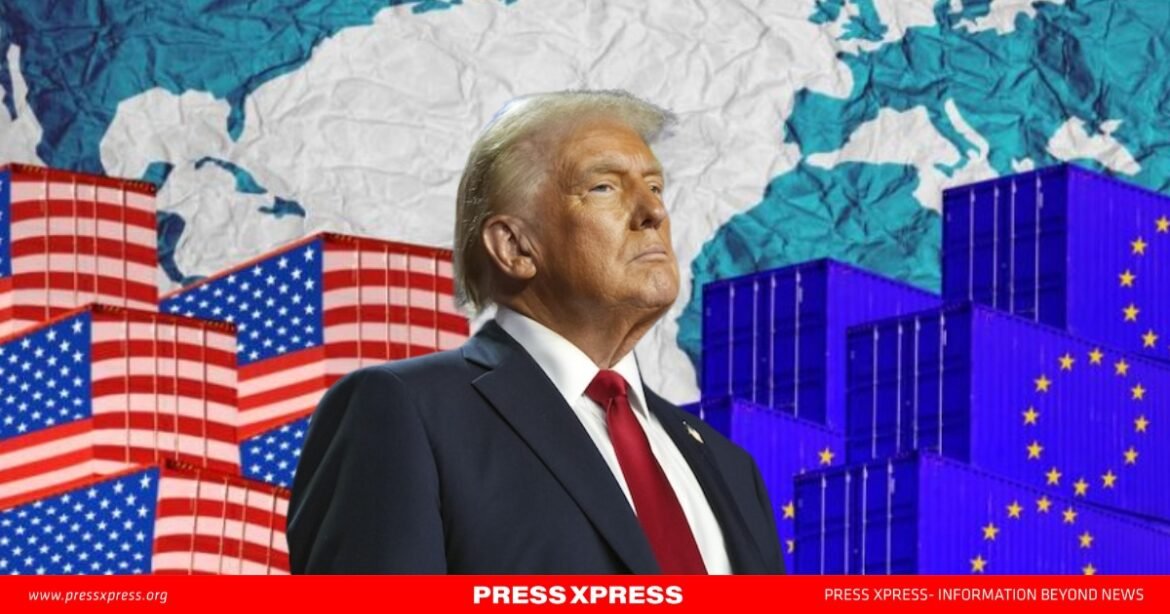Trump’s potential tariffs on the EU mark another chapter in his administration’s aggressive trade policy, which has already reshaped global commerce
After targeting Canada, Mexico, and China, U.S. President Donald Trump has now turned his focus toward the European Union (EU), threatening to impose tariffs on EU imports. With Trump claiming that the EU has “severely disadvantaged” the United States for years, this escalation in trade tensions could significantly impact global markets, investor confidence, and diplomatic relations. Given the economic interdependence between the U.S. and the EU, this move could have far-reaching consequences for global trade and economic stability.
Why is Trump Targeting the EU?
The Trump administration has long criticized the EU for trade imbalances, particularly in the automotive and agricultural sectors. Trump has argued that the EU places excessive trade restrictions on U.S. exports while benefiting from access to American markets. His grievances include:
Automobile Trade Disparity: The U.S. imports millions of cars from Europe, particularly from Germany, but faces restrictions on exporting American-made vehicles to the EU.
Agricultural Market Barriers: Trump has accused the EU of blocking American agricultural products while benefiting from agricultural exports to the U.S.
Overall Trade Deficit: The U.S. has a persistent trade deficit with the EU, a point Trump has repeatedly highlighted as evidence of unfair trade practices.
Potential Consequences of an EU-U.S. Trade War
Economic and Market Disruptions
- Stock Market Volatility: Financial markets have historically responded negatively to tariff threats and trade disputes. A full-blown trade war between the U.S. and the EU could rattle investor confidence and lead to sharp declines in stock indices worldwide.
- Supply Chain Disruptions: Many multinational corporations rely on integrated supply chains across the U.S. and EU. Additional tariffs could raise production costs and slow down global trade flows.
Retaliatory Measures from the EU
- The EU has already signaled that it will respond with force if the U.S. imposes tariffs. In past trade disputes, the EU has targeted politically sensitive American industries, such as:
- Agricultural Exports (Soybeans, pork, and dairy products)
- Automotive Industry (Potential tariffs on U.S. car exports to Europe)
- Tech Industry (Increased scrutiny and regulations on U.S. tech giants operating in Europe)
- Such retaliation could exacerbate economic tensions and hurt businesses on both sides of the Atlantic.
Diplomatic Fallout
- U.S.-EU relations could suffer significantly, complicating cooperation on broader geopolitical issues, including NATO, climate policies, and global security concerns.
- The move could also drive the EU to strengthen economic ties with other global players like China, Russia, and India, further diminishing U.S. influence.
Impact on Global Trade Confidence
- The escalation of trade tensions between two of the world’s largest economic blocs could create uncertainty in global markets, discouraging investments and slowing economic growth.
- Emerging markets that depend on stable trade relationships between the U.S. and the EU may experience economic ripple effects, further exacerbating global financial instability.
Exemptions for the UK?
Interestingly, Trump has hinted that the UK might be exempt from these tariffs, citing progress in trade negotiations with Prime Minister Keir Starmer. This could signal a shift in post-Brexit trade alignments, potentially giving the UK preferential treatment over its former EU partners. However, any special deals between the U.S. and the UK could further strain the U.S.-EU relationship.
Conclusion
Trump’s potential tariffs on the EU mark another chapter in his administration’s aggressive trade policy, which has already reshaped global commerce. If implemented, these tariffs could have severe economic, diplomatic, and political repercussions, not just for the U.S. and EU but for global markets as a whole. With the EU prepared to retaliate and financial markets already on edge, the world could be heading toward another period of trade uncertainty. Whether these threats materialize or serve as a negotiating tactic remains to be seen, but one thing is clear: global economic stability hangs in the balance.


